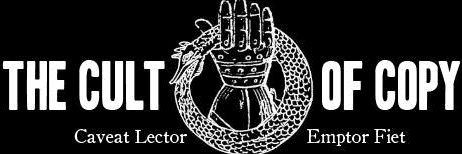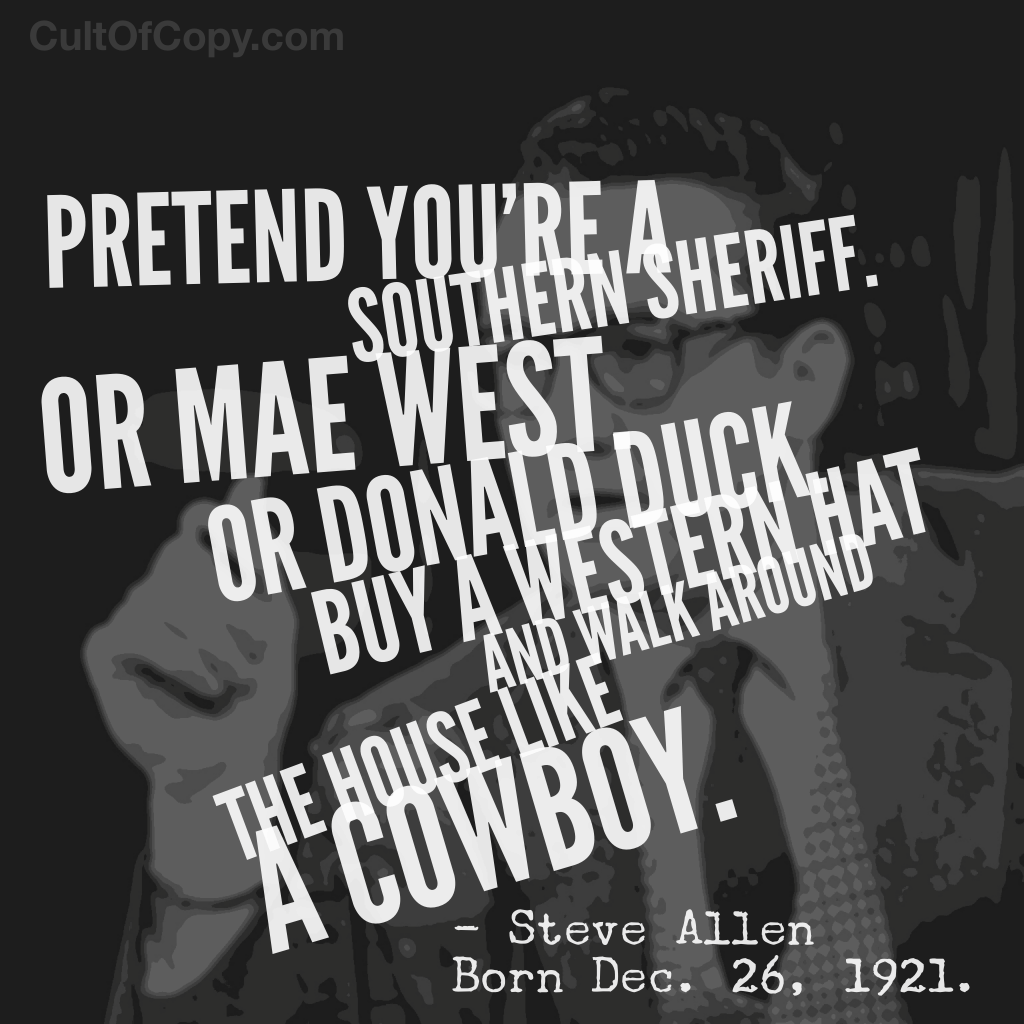“Pretend you're a southern sheriff. Or Mae West. Or Donald Duck. Buy a western hat and walk around the house like a cowboy. The point of all this, of course, is to draw yourself out of your accustomed groove.” – Steve Allen, Born Dec. 26, 1921.
A lot of entrepreneurial, self-employed, freelancer types like us suffer mightily from a thing they like to call “imposter syndrome” – the fear that you are secretly a phony and will ultimately be discovered, exposed, and ruined.
GOOD NEWS!
We hired gun professional persuaders are SUPPOSED to be impostors. That’s the job. As a copywriter, I try to pretend to be someone else who is speaking to their customers as if I am them. It’s an illusion.
Being able to fake things is very valuable for people like us.
We need to be able to fake empathy for situations we have never been in.
We need to be able to fake sympathy for the suffering of anonymous strangers reading our work that we will never meet.
We need to be able to fake the experience and knowledge and authority of experts who have walked down paths we only know by the stories they tell us – tell us only to prepare us for embellishing and polishing those tales for publication.
But here is the thing.
The brain cannot tell the difference between effective pretending and actual emotion. If you get good at faking it, the outcome is largely the same – effective communication.
It’s why “method” acting seems so realistic compared to the affected, contrived performances in film and theater that came before.
It’s a secret that fiction writers know. But we take it for granted because we aren’t making up fantasy, right?
Anyway, I promise this is going somewhere.
If you can nod your head in agreement with the above, and accept that it’s all true – I want to let you know that therein lies the secret strategy for busting out of any kind of writer’s block or desert of creativity.
It’s pretty advanced, but sounds super simple. When I tell you, I have to warn you that you may exhale in a smug chuckle of disdain.
Pretend to be someone else.
Play make believe.
Yes, I know. Seems silly. But not if you take it seriously. Do it for real. It’s stupid, and it’s silly, and it feels weird and embarrassing, but it WORKS.
Do a funny accent. Put on a costume.
Screw around and make yourself laugh.
Pretend to be someone you admire. What would they say and do?
Pretend to be someone you loathe. What kind of crap would they say?
Where is the truth? Somewhere in the middle. But now you’ve created an arena with the walls around the area you need to aim for.
I cannot stress this enough – if it feels silly and useless to you, you 100% need to do it.
Funny hat, silly accent, the whole thing.
Go to the mall or something and try on clothes you would never buy.
Look in the mirror of the dressing room and talk some smack. Talk like the kind of donkweed that dresses like that.
What does THAT guy (or gal) think about your current problem? What would THEY say you should do? What different emotions would they bring to the table?
Silliness can be a powerful tool for breaking blocks and barriers. It can pierce the hesitation and fear of embarrassment. And once that’s out of the way, you can get to the truth.
And truth sometimes speaks in a Donald Duck voice.


This one hit… hard.
Why?
It was through playing around with what I’ve learned via Colin that I’ve come to appreciate imaginative play in copy and how important it is to be able to use on the fly.
We are more wordsmith wonk than wizards, imo, but it’s only because we’ve got a job to do.
We are NOT the feelings and ability we’re trying to encapsulate.
We are the expression artists of those ideas.
The “correct angle” portrayal artists.
Our job, again, imo, to show to the audience what it is they need to see and feel in order to tap into their drive to take the next step.
That’s not us.
That’s us showing them to them as resonant as possible with our ways.
Colin… thank you.